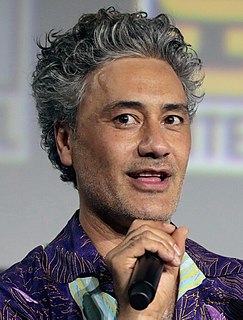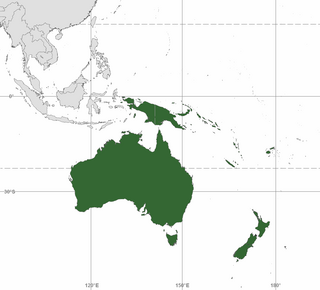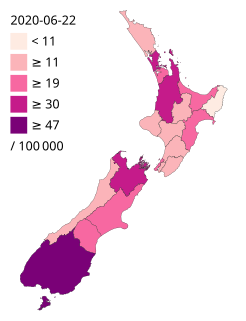
Oceania is a geographic region that includes Australasia, Melanesia, Micronesia and Polynesia. Spanning the eastern and western hemispheres, Oceania has a land area of 8,525,989 square kilometres (3,291,903 sq mi) and a population of over 41 million. When compared to continents, the region of Oceania is the smallest in land area and the second smallest in population after Antarctica.

Samoa, officially the Independent State ofSamoa and until 1997 known as Western Samoa, is an island country consisting of two main islands, Savai'i and Upolu, two smaller inhabited islands, Manono and Apolima, and several small uninhabited islands including the Aleipata Islands. The capital city is Apia. The Lapita people discovered and settled the Samoan Islands around 3,500 years ago. They developed a Samoan language and Samoan cultural identity.

Wellington is the capital city of New Zealand. It is located at the south-western tip of the North Island, between Cook Strait and the Remutaka Range. Wellington is the major population centre of the southern North Island, and is the administrative centre of the Wellington Region, which also includes the Kapiti Coast and the Wairarapa. It is the world's southernmost capital of a sovereign state. Wellington features a temperate maritime climate, and is the world's windiest city by average wind speed.

The North Island, also officially named Te Ika-a-Māui, is one of the two main islands of New Zealand, separated from the larger but much less populous South Island by Cook Strait. The island's area is 113,729 square kilometres (43,911 sq mi), making it the world's 14th-largest island. It has a population of 3,760,900.

Sir Edmund Percival Hillary was a New Zealand mountaineer, explorer, and philanthropist. On 29 May 1953, Hillary and Sherpa mountaineer Tenzing Norgay became the first climbers confirmed to have reached the summit of Mount Everest. They were part of the ninth British expedition to Everest, led by John Hunt. From 1985 to 1988 he served as New Zealand's High Commissioner to India and Bangladesh and concurrently as Ambassador to Nepal.

The prime minister of New Zealand is the head of government of New Zealand. The incumbent prime minister, Jacinda Ardern, leader of the New Zealand Labour Party, took office on 26 October 2017.

The New Zealand national rugby union team, commonly known as the All Blacks, represents New Zealand in men's international rugby union, which is considered the country's national sport. The team won the Rugby World Cup in 2011 and 2015, as well as in the inaugural tournament in 1987.

The New Zealand Parliament is the legislature (parliament) of New Zealand, consisting of the Queen of New Zealand (Queen-in-Parliament) and the New Zealand House of Representatives. The Queen is usually represented by her governor-general. Before 1951, there was an upper chamber, the New Zealand Legislative Council. The New Zealand Parliament was established in 1854 and is one of the oldest continuously functioning legislatures in the world. It has met in Wellington, the capital of New Zealand, since 1865.

The New Zealand Order of Merit is an order of merit in New Zealand's honours system. It was established by royal warrant on 30 May 1996 by Elizabeth II, Queen of New Zealand, "for those persons who in any field of endeavour, have rendered meritorious service to the Crown and nation or who have become distinguished by their eminence, talents, contributions or other merits", to recognise outstanding service to the Crown and people of New Zealand in a civil or military capacity.

The New Zealand national cricket team represents New Zealand in men's international cricket. Nicknamed the Black Caps, they played their first Test in 1930 against England in Christchurch, becoming the fifth country to play Test cricket. From 1930 New Zealand had to wait until 1956, more than 26 years, for its first Test victory, against the West Indies at Eden Park in Auckland. They played their first ODI in the 1972–73 season against Pakistan in Christchurch.
Recorded Music NZ is a non-profit trade association of record producers, distributors and recording artists who sell recorded music in New Zealand. Membership of Recorded Music NZ is open to any owner of recorded music rights operating in New Zealand, inclusive of major labels, independent labels and self-released artists. Recorded Music NZ has over 2000 rights-holders.

New Zealand is an island country in the southwestern Pacific Ocean. It comprises two main landmasses—the North Island and the South Island —and around 600 smaller islands, covering a total area of 268,021 square kilometres (103,500 sq mi). New Zealand is about 2,000 kilometres (1,200 mi) east of Australia across the Tasman Sea and 1,000 kilometres (600 mi) south of the islands of New Caledonia, Fiji, and Tonga. The country's varied topography and sharp mountain peaks, including the Southern Alps, owe much to tectonic uplift and volcanic eruptions. New Zealand's capital city is Wellington, and its most populous city is Auckland.

Taika David Cohen, known professionally as Taika Waititi, is a New Zealand filmmaker and actor. He is the recipient of an Academy Award as well as two further nominations.

Auckland is a metropolitan city in the North Island of New Zealand. The most populous urban area in the country, Auckland has an urban population of about 1,467,800. It is located in the Auckland Region—the area governed by Auckland Council—which includes outlying rural areas and the islands of the Hauraki Gulf, resulting in a total population of 1,642,800. Auckland is a diverse, multicultural and cosmopolitan city, home to the largest Polynesian population in the world. The Māori-language name for Auckland is Tāmaki Makaurau, meaning "Tāmaki desired by many", in reference to the desirability of its natural resources and geography.

Jacinda Kate Laurell Ardern is a New Zealand politician who has served as the 40th Prime Minister of New Zealand and Leader of the Labour Party since 2017. She has been the Member of Parliament (MP) for Mount Albert since March 2017, having first been elected to the House of Representatives as a list MP in 2008.

Australasia comprises Australia, New Zealand, and some neighbouring islands. It is used in a number of different contexts including geopolitically, physiogeographically, and ecologically where the term covers several slightly different but related regions.

Helen Elizabeth Clark is a New Zealand politician who served as the 37th Prime Minister of New Zealand from 1999 to 2008, and was the Administrator of the United Nations Development Programme from 2009 to 2017. She was New Zealand's fifth-longest-serving prime minister, and the second woman to hold that office.

The Māori are the indigenous Polynesian people of mainland New Zealand. Māori originated with settlers from eastern Polynesia, who arrived in New Zealand in several waves of waka (canoe) voyages between roughly 1320 and 1350. Over several centuries in isolation, these settlers developed their own distinctive culture, whose language, mythology, crafts and performing arts evolved independently from those of other eastern Polynesian cultures. Some early Māori moved to the Chatham Islands where their descendants became New Zealand's other indigenous Polynesian ethnic group, the Moriori.

Two consecutive mass shootings occurred at mosques in a terrorist attack in Christchurch, New Zealand, during Friday Prayer on 15 March 2019. The attack, carried out by a single gunman who entered both mosques, began at the Al Noor Mosque in the suburb of Riccarton at 1:40 p.m. and continued at Linwood Islamic Centre at 1:52 p.m. He killed 51 people and injured 49.

The COVID-19 pandemic in New Zealand is part of the ongoing pandemic of coronavirus disease 2019 caused by severe acute respiratory syndrome coronavirus 2. The first case of the disease in New Zealand was reported on 28 February 2020. As of 25 July 2020, the country has had a total of 1,556 cases and 22 people have died from the virus, with cases recorded in all twenty district health board (DHB) areas. The pandemic peaked in early April, with 89 new cases recorded per day and 929 active cases. As of 24 July 2020, the country has 21 active cases, all from people in managed isolation following travel to New Zealand. There have been no locally-acquired cases reported since 22 May 2020.

















